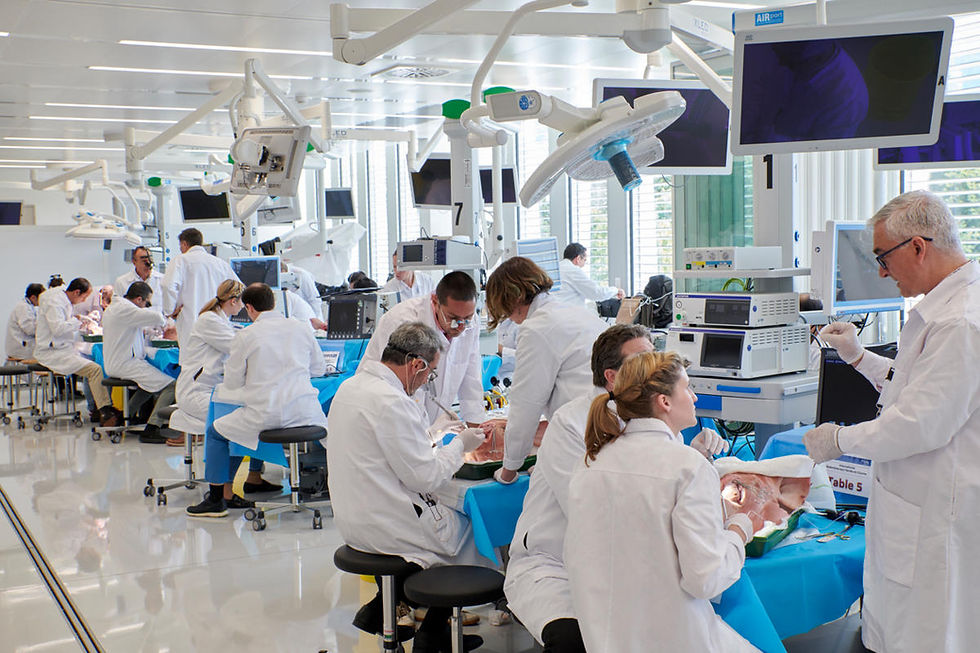ISIAL

In many countries, international sialendoscopists have united to share their experiences and to increase their knowledge in creating local or national societies of sialendoscopy.
As the technique is rapidly growing and as challenges are multiple, in terms of medical indications, surgical novelties and insurance reimbursements, Professor Marchal in Geneva thought that time had came bringing experts from all countries together under one umbrella.
Professor MARCHAL started the development of a proper instrumentation and technique in 1995. After 30 years, sialendoscopy is now practiced worldwide. Numerous physicians have visited the European Sialendoscopy Training Centre (ESTC) in Geneva, Switzerland, leading to the creation of a large network of colleagues. Many of them have been instrumental in teaching this challenging technique, both in their respective nations and at the ESTC annual course. At present, over thousand centers practice sialendoscopy around the world. A large number of them are affiliated to the ESTC network, as evidenced by the book of Sialendoscopy written by 154 authors of 40 countries.
In 2012, 250 physicians from 45 countries met in Geneva for the First International Sialendoscopy Conference (FISC). This indicated that the critical mass of specialist dealing with salivary gland diseases and interested in sialendoscopy had been achieved, thereby, securing the future of the technique.
In January 2020, the Second International Sialendoscopy Conference (SISC) took place in Dubai during the EROC meeting.
In September 2023, the Third International Sialendoscopy Conference (TISC) was again organized in Geneva.
In January 2025, the Fourth International Sialendoscopy Conference (FISC) took again place in Dubai.
Salivary gland diseases taken individually are rare diagnoses, and several years are needed in order to achieve a reasonable degree of experience in treating them. As such, only through collaboration will it be possible to organize the prospective multicenter trials necessary to progress.
The iSIAL offers a plattform of exchange of sialendoscopists from all countries and continents.
In the future, the ESTC network, via the International Sialendoscopy Society, would like to contribute even more to the training of new experts by providing fellowships and grants, particularly in resource-poor countries where funding of training remains problematic due to other competing priorities in health care.
Since its advent, sialendoscopy has evolved and will continue to do so with an immense potential for technological advances, exchange of scientific knowledge, and diffusion of clinical practice and surgical training worldwide, all of which will enable the multidisciplinary care of patients with inflammatory salivary gland disorders.
To improve the management of salivary gland diseases, supranational societies, such as the Multidisciplinary Salivary Gland Society have been formed to unite specialists (basic researchers, radiologists, surgeons, radiotherapists, chemotherapists, immunologists, rheumatologists, etc…) with an interest in salivary gland disesase.
The Multidisciplinary Salivary Gland Society (MSGS) - founded in 2005 by Prof. Marchal and the most prominent colleagues in the field of salivary gland diseases - is becoming increasingly active, as the field of salivary glands is expanding.
Several collaborative projects are currently running. Examples include the implementation of databases on-line for parotid tumors, and for non tumoral diseases treated by sialendoscopy.
The international sialendoscopy society (iSIAL) - founded in 2012 by Prof. Marchal and all Sialendoscopy experts - gathers now all groups over all continents.
Aims & objectives
-
Unite sialendoscopists from around the world
-
Promote educational activities
-
Widen the network available for patients to access information
-
Help to convince insurance companies to reimburse the technique because of its advantages, safety and efficacy compared to conventional salivary gland surgery, which has a significant higher morbidity
MSGS
The Multidisciplinary Salivary Gland Society is linked with the Japanese Salivary Gland Society, the Chinese Salivary Gland Society. The Honorary President of MSGS is Professor Eugene Myers from Pittsburgh, and the current President is Prof. Vincent Vander Poorten from Leuven in Belgium.
The MSGS is one of the 14 founding European Societies of the European Academy of ORL-Head and Neck Surgery, which became in the mean time the European Confederation of ORL.
ESTC
The Multidisciplinary Salivary Gland Society support also the European Sialendoscopy Training Centre (ESTC) created in 2002 in Geneva. This centre aims to train clinicians and procedures associated with diagnostic and therapeutic sialendoscopy, to organise international courses in order to allows for exchange of knowledge, experiences and advances gained by clinical leaders disseminated around the world. The courses consist in hands on training on pig heads, conferences, debates, and live surgery.